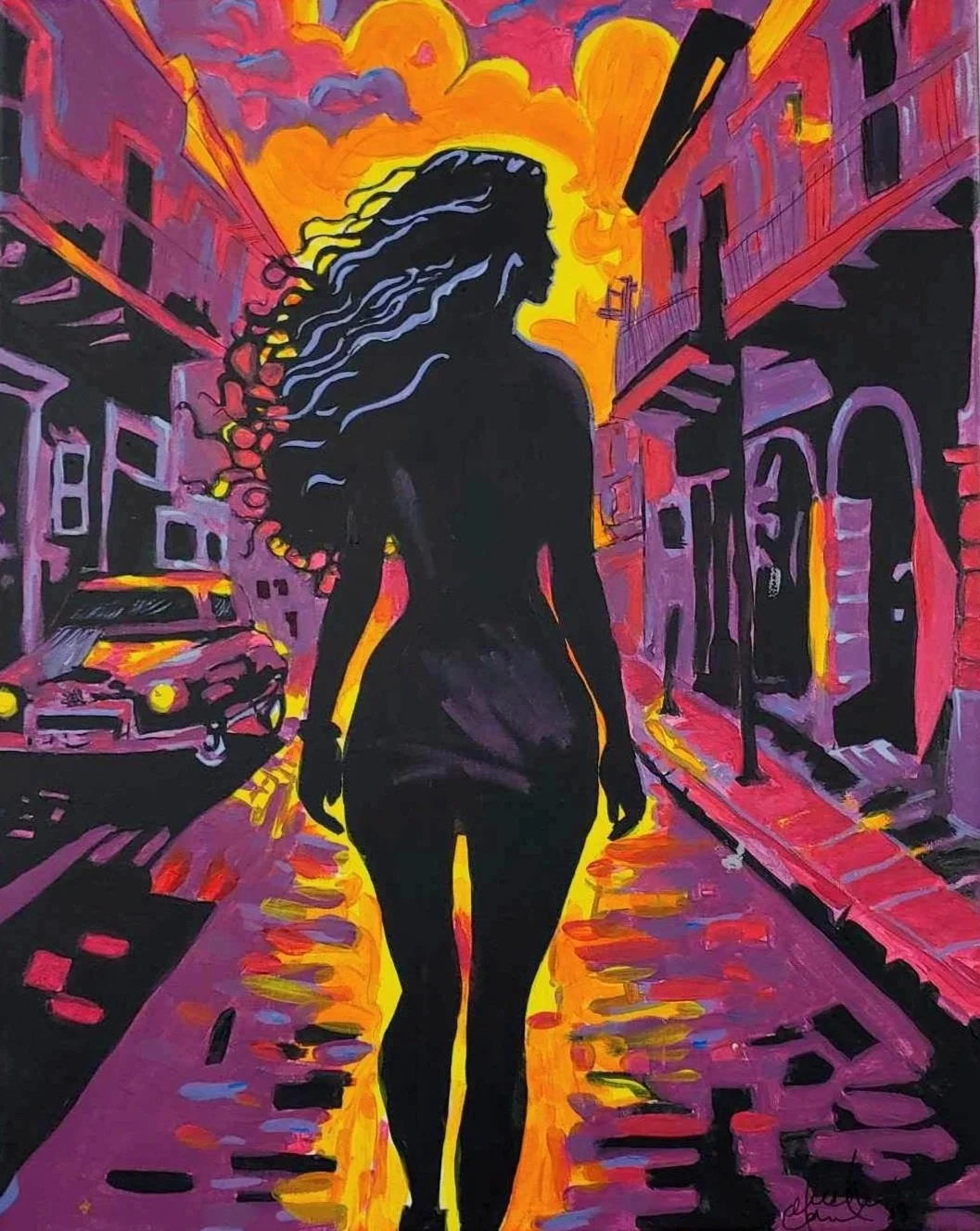THE HOME I NEVER KNEW: NI DE AQUÍ, NI DE ALLÁ
June 7 - November 1, 2024
Greenville Museum of Art | West Wing & Commons Galleries
Iesha Ford
“It’s in my roots, this homesickness of an uprooted plant.”
White Washed History
2019
acrylic on canvas
La Borinqueña
2024
acrylic on canvas
The Island In My Mind
2023
acrylic on canvas
ARTIST STATEMENT
As a child in foster care, I grew up disconnected from my family and my roots. As I grew older, I began to understand the importance of representation and cultural traditions. “La Borinqueña” is a piece I created reflecting my pride in my family and my Puerto Rican background, the central figure is my younger sister. I wanted her to see her own beauty and the beauty of her culture. I grew up in North Carolina, with most of my childhood spent in foster care. Being placed among a wide variety of families, I was never taught my own culture or language – always learning someone else’s. Even the schools neglected to teach about Puerto Rican history. There came a point in my life in which I felt an intense longing for a home I never knew, and had never seen. “The Island in My Mind” is a piece I created exploring my longing to be “home.” Everything I’ve learned about the island I had to research myself and by doing so I’ve come to realize just how much history has become “whitewashed” and hidden. “White Washed History” is a piece I created while reflecting on the richness of my cultural background and how it is constantly hidden away and manipulated by U.S. history.
DECLARACIÓN DEL ARTISTA
Como menor en hogares de acogida, crecí desconectada de mi familia y mis raíces. A medida que fui creciendo, empecé a entender la importancia de la representación y las tradiciones culturales. “La Borinqueña” es una pieza que creé al reflexionar sobre el orgullo que siento por mi familia y mis antecedentes puertorriqueños, la figura central es mi hermana pequeña. Quería que viera su propia belleza y la belleza de su cultura. Crecí en Carolina del Norte y pasé la mayor parte de mi niñez en hogares de acogida. Al ser asignada a una amplia variedad de familias, nunca me enseñaron sobre mi propia cultura ni idioma, siempre aprendí de los de alguien más. Incluso las escuelas pasaban por alto enseñar sobre la historia puertorriqueña. Llegó un punto en mi vida en el que sentí un anhelo intenso de un hogar que no conocía y que nunca había visto. “La isla en mi mente” es una pieza que creé al explorar mi anhelo de estar en “casa”. Todo lo que he aprendido sobre la isla lo tuve que investigar yo misma y al hacerlo me he llegado a dar cuenta lo mucho que se ha “blanqueado” y escondido la historia. “Historia blanqueada” es una pieza que creé al reflexionar sobre la riqueza de mis antecedentes culturales y cómo se esconde y manipula constantemente por parte de la historia de los Estados Unidos.
INTERVIEW WITH THE ARTIST | ENTREVISTA CON LA ARTISTA
When did you first realize you longed for a home you never knew? After all these years, have you found it yet? In high school, I recognized that I missed something but couldn’t really tell what that was. It was a feeling I had my whole life but it wasn’t until college that I could put a word to it: Hiraeth - longing for a home that doesn’t exist.
Who did you look to for guidance in being Latino (family, friends, media, etc.)? I often looked to media for guidance about being Latina, especially since I didn’t have any relatives to teach me.
How did your perspective change from being in the foster care system? I don’t think my prospective changed being in foster care since I went into the system pretty young.
What message do you want your work to convey? The work I make voices my own internal struggles of identity and belonging and an odd sense of pride. It’s loud and bold and colorful like the island of Puerto Rico. I want my work to reflect who I am as an artist and my journey.
Do you feel as though your identity separates you from those around you, if so when did you first notice this separation? I don’t believe I have found it yet, but I do believe that it lies in my heritage, in Puerto Rico with the Taino. It’s in my roots, this homesickness of an uprooted plant.
You mention your sister’s importance; when you look at her, what do you hope for her? For my sister, I hope she grows to understand that she is an important part of keeping her heritage alive and that she has a magic in her that will keep her future bright.
When did you become aware of history being whitewashed? I was aware of this white washed history in 5th grade when we were taught how America came to be. It became more obvious in middle and high school as well. The teachers would quickly brush over the English arrival in Puerto Rico and even the history books down played the severity of mistreatment and genocide committed against natives.



